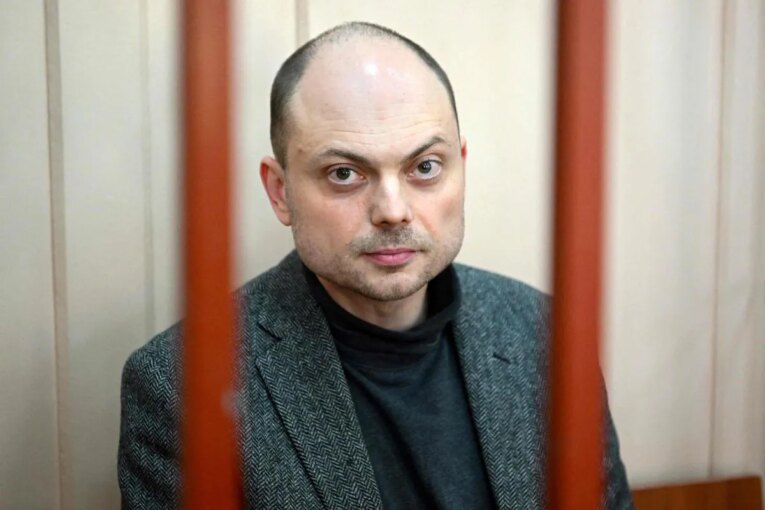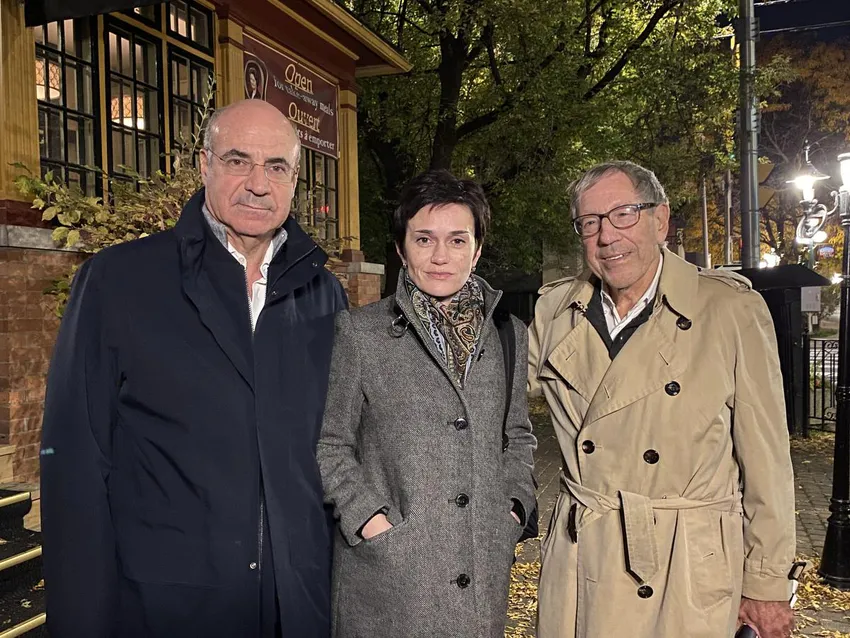
OTTAWA—They tried twice — with poison — to deprive Vladimir Kara-Murza of his life.
Now they’ve has taken his liberty.
The 41-year-old Russian opposition politician was thrown in jail last April. First, it was the dubious charge of spreading fake news about the Russian Army in Ukraine and being part of a banned organization. Now, prosecutors have added charges of high treason, which could see him spend the next quarter century in prison.
But Russia will not steal the voice of the man who is one of Vladimir Putin’s most fierce and elegant critics.
So vowed his enraged wife, Evgenia Kara-Murza, in an exclusive interview with the Star, as she set out the case for the Canadian government to sanction those who have persecuted her husband and violated his human rights.
“This is my best friend. This is the father of my children, and the idea was to raise our (three) kids together,” she said. “I’m not OK with him being thrown in prison for publicly denouncing Putin’s war crimes in Ukraine. I’m not OK with them throwing him in prison for asking for sanctions against those criminals and murderers of the regime. I’m not OK with it, so I will fight with whatever I’ve got.
“They will not be able to silence him because, for as long as I am standing, I’m going to be his voice.”
Along with former Canadian justice minister Irwin Cotler, a renowned human rights lawyer, as well as Bill Browder, the businessman and best-selling author of “Red Notice,” who has campaigned for countries to fight persecution using targeted sanctions against perpetrators, Evgenia Kara-Murza wants Canada to lead the world by cracking down on the police, prosecutors and judges who have landed her husband in a Moscow detention centre.
“If Canada does this, there will be a domino effect around the world. Other countries will join Canada in sanctioning the people who are persecuting Vladimir,” said Browder, who described Kara-Murza as “one of the two or three most important political prisoners in Russia.”
“Canada, despite its small population, punches way above its weight in terms of its moral authority, and I believe that America may follow Canada very quickly.”
They have proposed that the federal government bring sanctions against more than a dozen Russians, including four judges, four police officers, three prosecutors and three attempted killers under the Justice for Victims of Corrupt Foreign Officials Act, which was adopted in 2017 and is known as the Magnitsky Act.
Sergei Magnitsky was a Russian tax lawyer who worked with Browder’s investment firm, Hermitage Capital Management, to expose government fraud and corruption. He was arrested and died in prison in 2009 of heart failure and toxic shock.
Instead of being treated for pancreatitis and gall bladder disease, Magnitsky was prescribed a psychological assessment.
Thirty-five countries have adopted their own Magnitsky-type sanctions legislation, with the latest being the lower house of the Czech Republic’s parliament last week.
Since Canada passed its law in 2017, sanctions have been brought against scores of human-rights violators in South Sudan, Venezuela, Russia, Myanmar and Saudi Arabia. The penalties freeze the assets of named individuals in Canada and bar them from entering the country.
That may seem like a slap on the wrist to a Moscow cop, a Saudi assassin, a Sudanese general or Venezuelan President Nicolás Maduro. But the law allows Canada and other nations to shine a spotlight on the violators — naming and shaming individuals who kill, torture, rape, steal, intimidate and oppress —while also siding for all the world to see with the persecuted.
“The only court that matters is the court of global public opinion,” Kara-Murza said himself in 2019 when he testified at a House of Commons Committee on Foreign Affairs and International Development.
“The best hope, the best defence, for political prisoners in our country is international attention.”
Cotler, who helped obtain the release of Soviet dissident Anatoly Sharansky in 1986, said it came only after seven years of committed pressure by Canada and other western countries.
In 1983, the Free Sharansky campaign targeted a Soviet agricultural official who was visiting Canada by the name of Mikhail Gorbachev.
The future general secretary of the Communist Party was assailed about the plight of Sharansky — a name and case he knew nothing about — at a Canadian parliamentary committee, then by a crowd outside the Parliament Buildings, then by the agriculture minister, he later confided to Cotler.
“When I became the head of the Soviet Union, I ordered up his file,” Gorbachev recounted, according to Cotler. “Yes, he was a troublemaker, but he wasn’t a criminal. It was costing us to keep him in prison … so I ordered his release in our self-interest.”
Cotler noted that Kara-Murza’s two poisoning attempts, in 2015 and 2017, both occurred right after he had come to Ottawa to give damning testimony about the political situation in Putin’s Russia — a harrowing Canadian link to an international travesty.
But Evgenia Kara-Murza said she has no fear that additional sanctions would end up aggravating the Kremlin and somehow worsening her husband’s plight.
“What worse can happen? He was already targeted twice for assassination,” she said. “I think that publicity is our only weapon in the fight for human rights. I think it is much easier to kill someone when no one is watching.”
Despite the hopeful optimism that Canada’s Global Affairs Minister Mélanie Joly will fulfill their request, there was a feeling of heaviness, or an absence, around the table at the back of the Italian restaurant where the interview took place late Sunday, just a few blocks from Parliament Hill.
Evgenia Kara-Murza, who lives in the U.S. with the couple’s three children, was jet-lagged after travelling to Europe to collect the Council of Europe’s Vaclav Havel Human Rights Award on her husband’s behalf.
Cotler and Browder have made the parliamentary rounds numerous times to talk about Russia’s abysmal human rights record, but rarely without Kara-Murza, who speaks perfect French, English and Russian, and who, in Browder’s estimation, “spoke like a master statesman.”
“I was in awe of this young man. It was just unbelievable. He was the best spokesperson there ever could be, from a Russian perspective, on why targeted sanctions against human rights abusers and kleptocrats was a good thing.”
When Putin ordered Russian troops to invade Ukraine last February, it quickly became clear to all that the Kremlin’s tolerance for dissent had vanished. Thousands were arrested for protesting in the first weeks of the war. Russia’s remaining independent media outlets were shut down or relocated outside of the country — the only place where they could continue to report freely.
Browder recalled having dinner with the Kara-Murza’s a few nights before Vladimir was set to return to the country.
“I begged him not to go back to Russia. After two assassination attempts, after the war had started …” Browder recalled.
“He said, ‘As a leader of the Russian opposition, how can I ask anyone else to stand up to Putin if I’m too afraid to go back to my own country?’”
That is just the type of person he is, said Evgenia.
“In his opinion, as a Russian politician, he would not have the moral right to call on people in Russia to protest if he himself were somewhere safe,” she said.
Cotler, who noted that there have been some 19,000 people arbitrarily detained in Russia, likened Kara-Murza to Soviet dissident prisoners such as Sharansky and Andrei Sakharov, the nuclear scientist who was awarded the Nobel Peace Prize in 1975 for championing civil liberties and human rights.
“Vladimir is the contemporary embodiment of the struggle for democracy and human rights in Russia,” Cotler said. “He’s the ultimate Russian patriot.”
A patriot charged with treason.
The charges stem from three speeches in which Kara-Murza criticized Russia’s 2021 constitutional changes for extending Putin reign, alleged that politically motivated killings occur in Russia and argued for the need to circumvent the Kremlin-imposed censorship over the war in Ukraine, according to his Russian lawyer.
“I just wanted to ask you a question,” Browder said mid-interview, addressing himself to Evgenia Kara-Murza with a question legal mathematics. “Isn’t (the maximum jail sentence) 22 years on top of the 14 years they’re already hitting him with?”
The 14-year sentence relates to two criminal charges of working for an organization deemed by the Russian state as “undesirable” and spreading fake news about the military.
“I think the maximum for high treason is 22 (years) but they’ve combined everything and now, according to his lawyers, it’s up to 24 years,” she explained.
She spoke with a fighter’s determination, but also with a mother and wife’s despair.
“Twenty-four is enough. Our oldest one is going to be his age when (Vladimir) gets out.”
You can read more of the news on source




